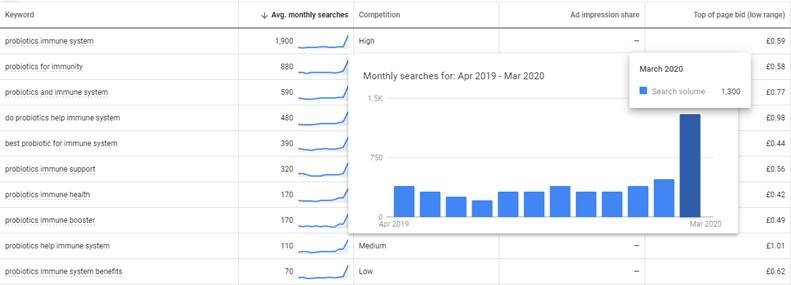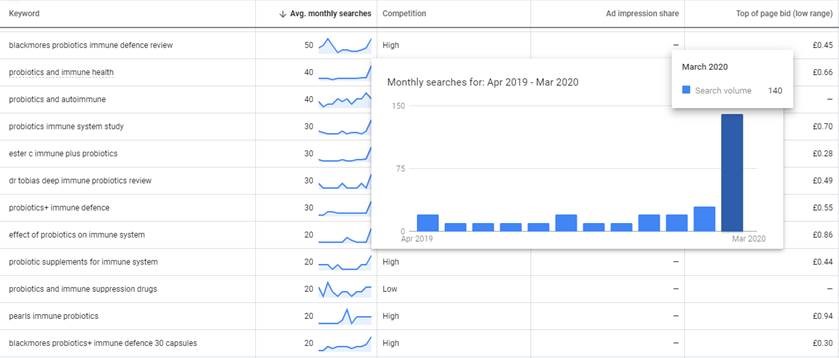Part
01
of one
Part
01
Gut Health Trends
Based on a market research, the volume of internet searches involving gut health experienced a 669% surge during the COVID-19 pandemic as more consumers turn their focus on food and ingredients that are seen as beneficial to their health such as probiotics. As most health problems originate in gut microbiome problems, consuming probiotics is being considered as one of the solutions to combat various health problems such as anxiety, fatigue, IBD, and others.
How Probiotics Fit Into the Current Consumer Health Trends
- According to Dr. Donald Cox, the Director of R&D at a health food company, the use of branded probiotics is a key trend to expect as gut health is gaining more traction among consumers.
- According to the expert, branded probiotics enables people to know more about the key ingredients that make the product effective. Companies that are manufacturing the products can also highlight certain research outcomes on the product. This can then help in gaining the confidence and long-term loyalty of the consumers.
- Experts are also seeing the proliferation of food items that contain probiotics as more consumers demand for these ingredients.
- There are also more proof found that consumers are now more aware of the benefits of ingredients that can make their digestive systems healthier.
- Based on an Innova market research, there are currently 11% more food products being launched that highlight their gut health benefits.
- There is also a 17% increase in products that feature probiotic benefits.
- Based on a consumer survey, 48% of the respondents mentioned that they mostly prefer to buy yogurt or yogurt-based items if asked to select among products that are beneficial to their digestive systems.
- Around 79% of the respondents view probiotics as beneficial to their gut health.
- Probiotics are also becoming more versatile with the discovery of strains such as the GanedenBC30, a Bacillus coagulans strain. These resilient and spore-generating strain is built to withstand extreme levels of acidity, temperature, and pressure compared to vegetative cells. This makes this strain more suitable to add in commonly-consumed food items. Some of the food products where this resilient strain can be applied include "tea, coffee, muffins, pizza, and peanut butter."
- This new strain also does not require the addition of a prebiotic to deliver its health benefits.
- Nevertheless, the use of prebiotics in food items is becoming more prevalent.
- As consumers turn their attention to digestive health consummables, companies are launching new products that contain prebiotics.
- Based on a Market and Markets report, the size of the global prebiotic segment is expected to increase from $4.07 billion in 2017 to $7.37 billion in 2023 at a yearly growth rate of 10.4%.
- Given this, the "food, beverage, and dietary supplement" sectors have embraced the consumer's preference for products with prebiotic ingredients.
- Due to this increasing focus on this ingredient, the Global Prebiotic Association was established to enable more knowledge dissemination initiatives in this space.
- According to an innovation director of another health products company, prebiotics are increasingly being recognized as the upcoming "super ingredient for digestive health."
- Around 29% of Americans understand that prebiotics can help them attain a healthy digestive systems.
- Based on industry reports, there will be a 44% continuous increase in the understanding of the benefits of prebiotics through 2025. This interest is being propelled by research advancements in this field.
- However, experts are just in the initial stages of discovering the significance of human microbiome to a person's general health and not just digestive health. As an example, new research outcomes reveal that people's dispositions and brain structures may be linked with the bacterial makeup of their microbiome.
- Based also on a research from Mintel, the volume of internet searches involving gut health experienced a 669% surge. This result was further propelled by the COVID-19 pandemic as more consumers turn their focus on food and ingredients that are seen as beneficial to their health.
- This shows that consumers are now becoming more aware of "gut health" and its importance to their general wellbeing.
- Microbiome interventions have been linked with health benefits such as immunity, enhanced cognition, and mood. To gain these benefits, food items that are rich in microbiome-tested interventions such as prebiotics and probiotics need to be consumed regularly.
- Given this, food innovators have been researching on ways to increase the consumption of these beneficial food items and how various forms of this product can be incorporated into the consumer's daily eating habits.
- When the pandemic started to explode in March, there has been a surge in the number of Google searches involving probiotics and how this ingredient can help the immune system. This topic is also gaining some traction when the pandemic started emerging in February as seen from the chart below:
For products that highlight their immune system benefit, there is also a surge in search volume during the pandemic. Some probiotic brand even got a 500% jump in search volume.
- Furthermore, more than 1,000 probiotics that were intended to boost immunity experienced a 786% increase in online customer reviews in the last two years. For 2020, the number of reviews hit 1.8 million across 25 countries.
- Globally, U.S. registered the biggest number of probiotics (197 products) for this year.
- Based on a HealthFocus survey on digestive health, 81% of consumers are focused on general wellness instead of choosing products that are meant only for specific health concerns.
- Around 54% of the consumers have also been found to be highly interested in the "gut microbiome."
- The continuous growth of the probiotics industry has made consumers more aware of probiotics and its benefits. Currently, around 90% of the consumers surveyed mentioned that they are aware of probiotics.
- Based on available market research data, the probiotics market globally will see an annual growth rate of 6.7%. The market's future worth will be around $76.7 billion in 2027. The growth of the market was attributed to the increasing consumer awareness of the positive health benefits of probiotics.
Conditions that May Be Addressed by Probiotics
- Based on early research findings, certain probiotic bacteria strains can help those with irritable bowel syndrome (IBD.
- Initial clinical data also revealed that probiotics may be helpful in managing Crohn's disease symptoms such as IBD.
- Based on a new study, a combination of prebiotics and probiotics can help minimize the symptoms of depression.
- This study also support other research findings that link digestive health to mental health.
- Based on a new research study from the Arizona State University, the presence of probiotics in the gut could help address obesity. However, more research are needed to confirm this.
- Probiotics can also help in addressing the imbalance of bacteria in the gut that contributes to chronic fatigue syndrome. As probiotics help in balancing the gut microbiome, consuming probiotics is being considered as one of the solutions to combat fatigue.

